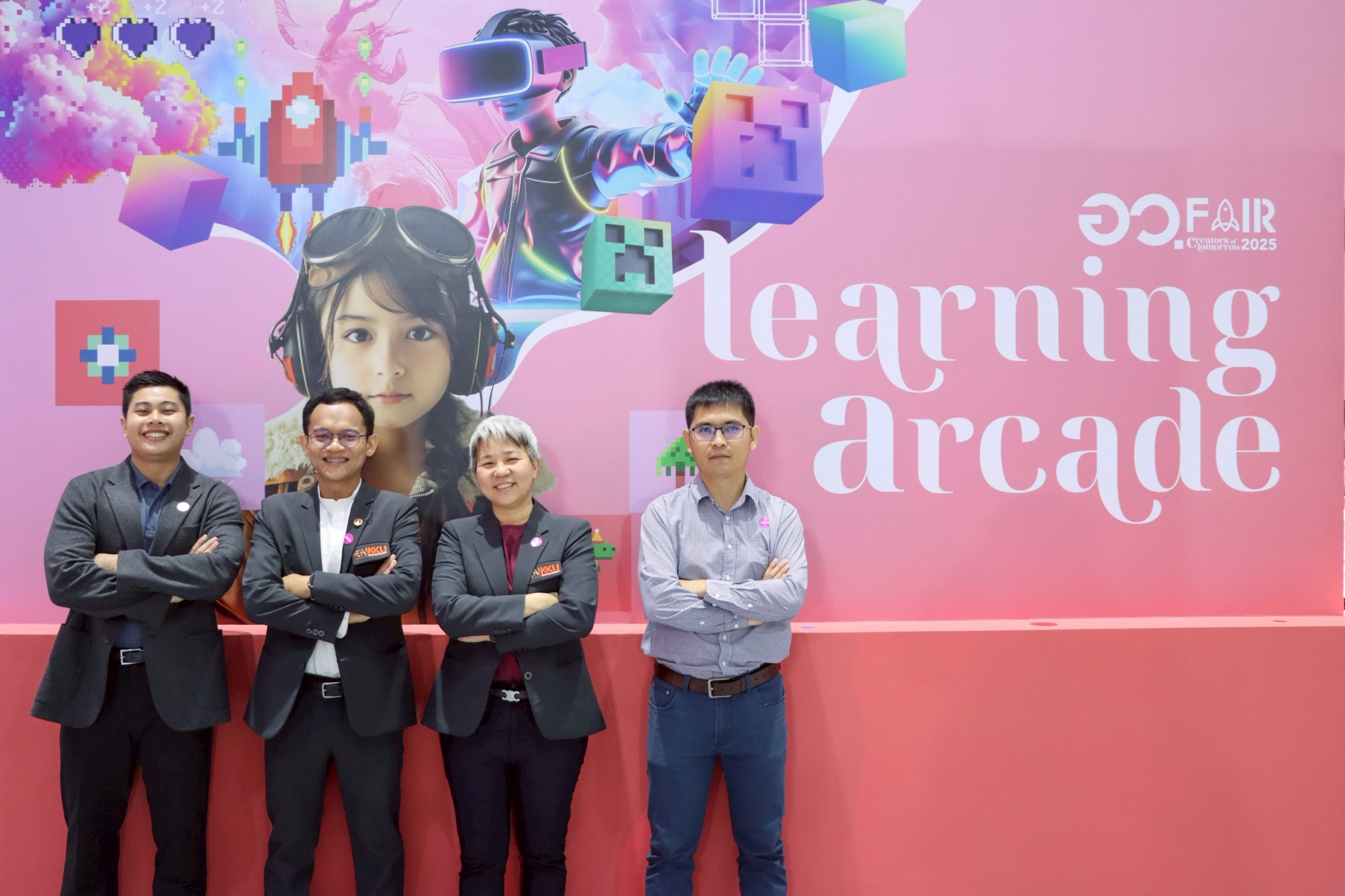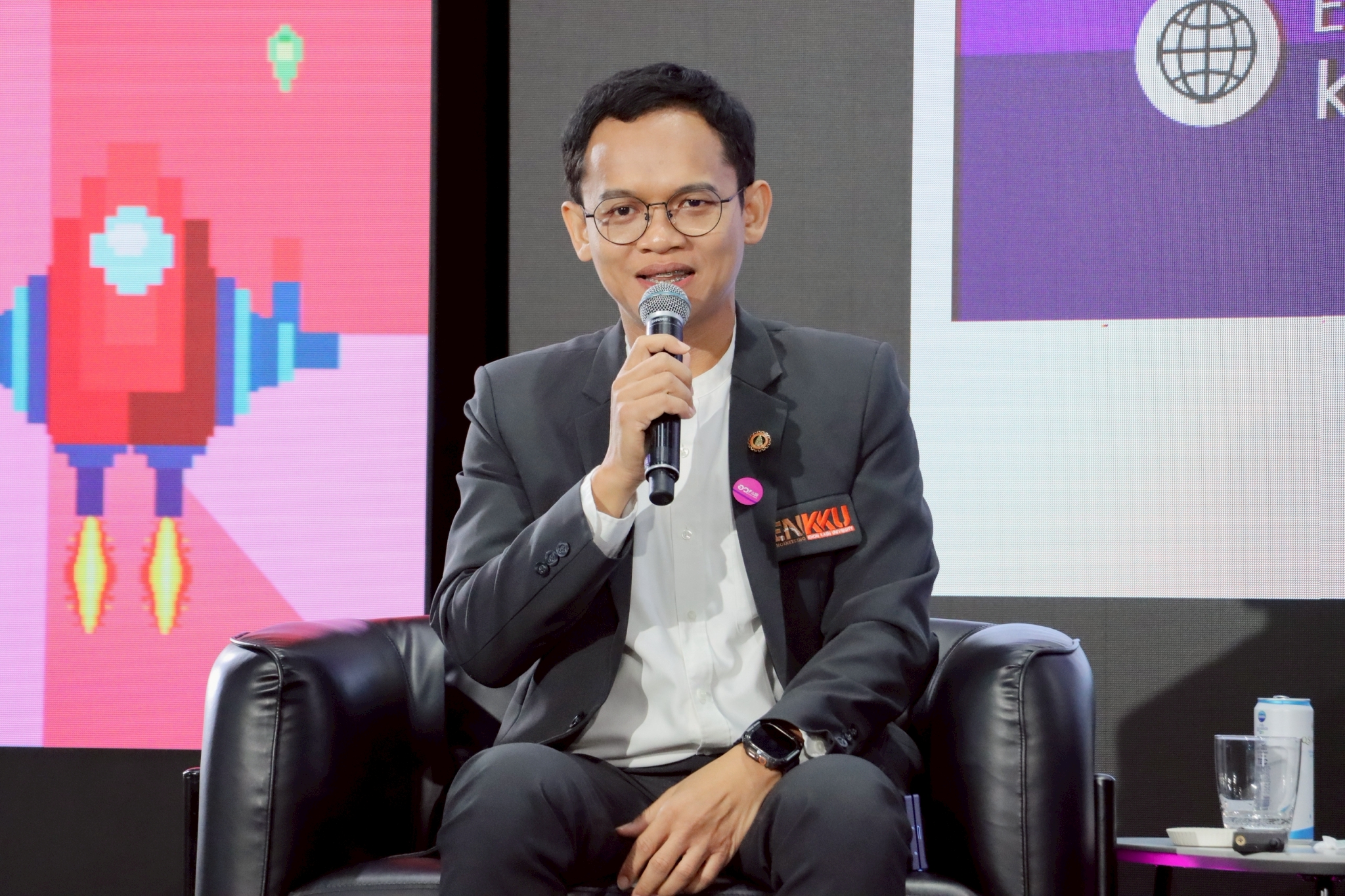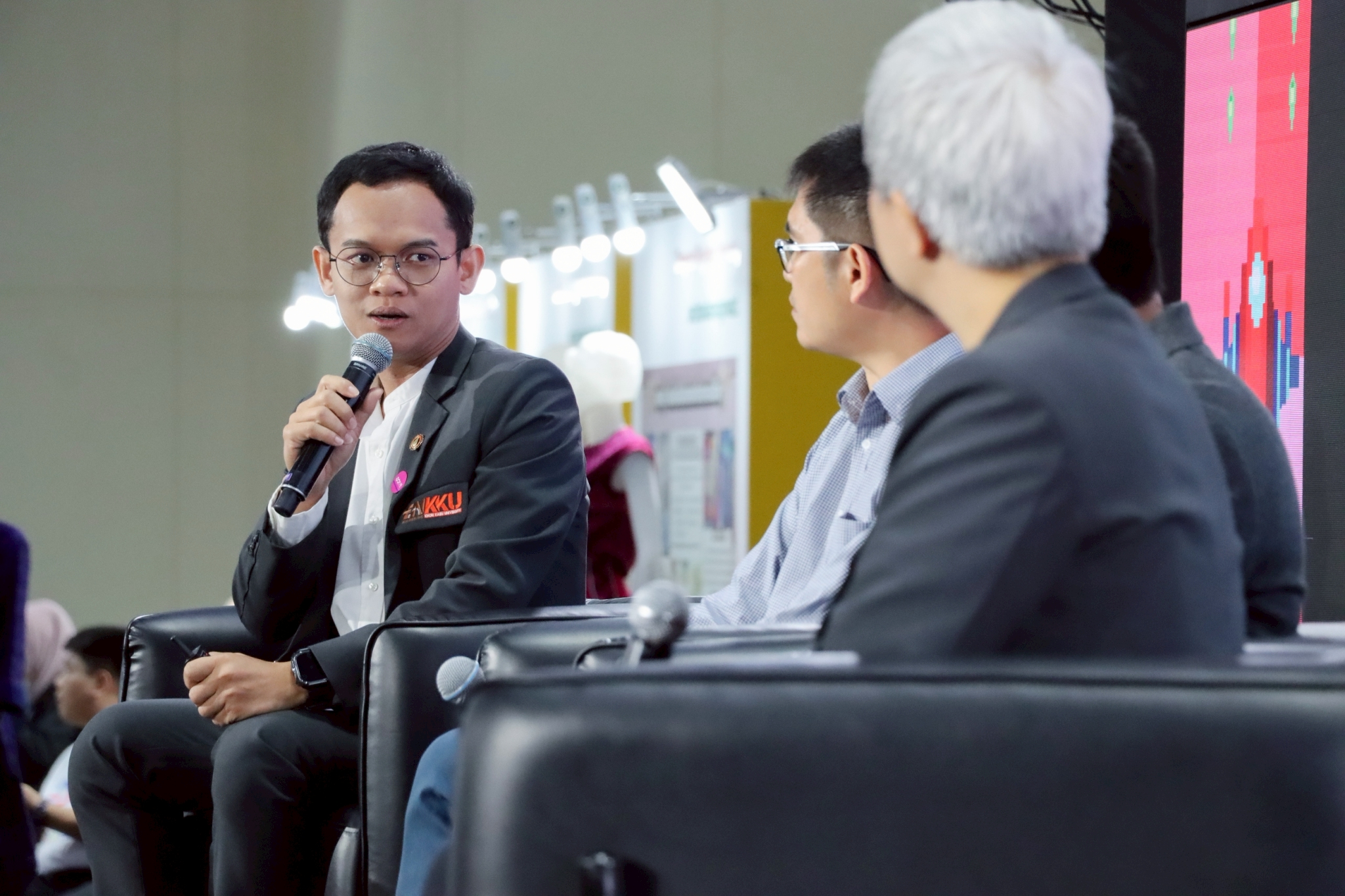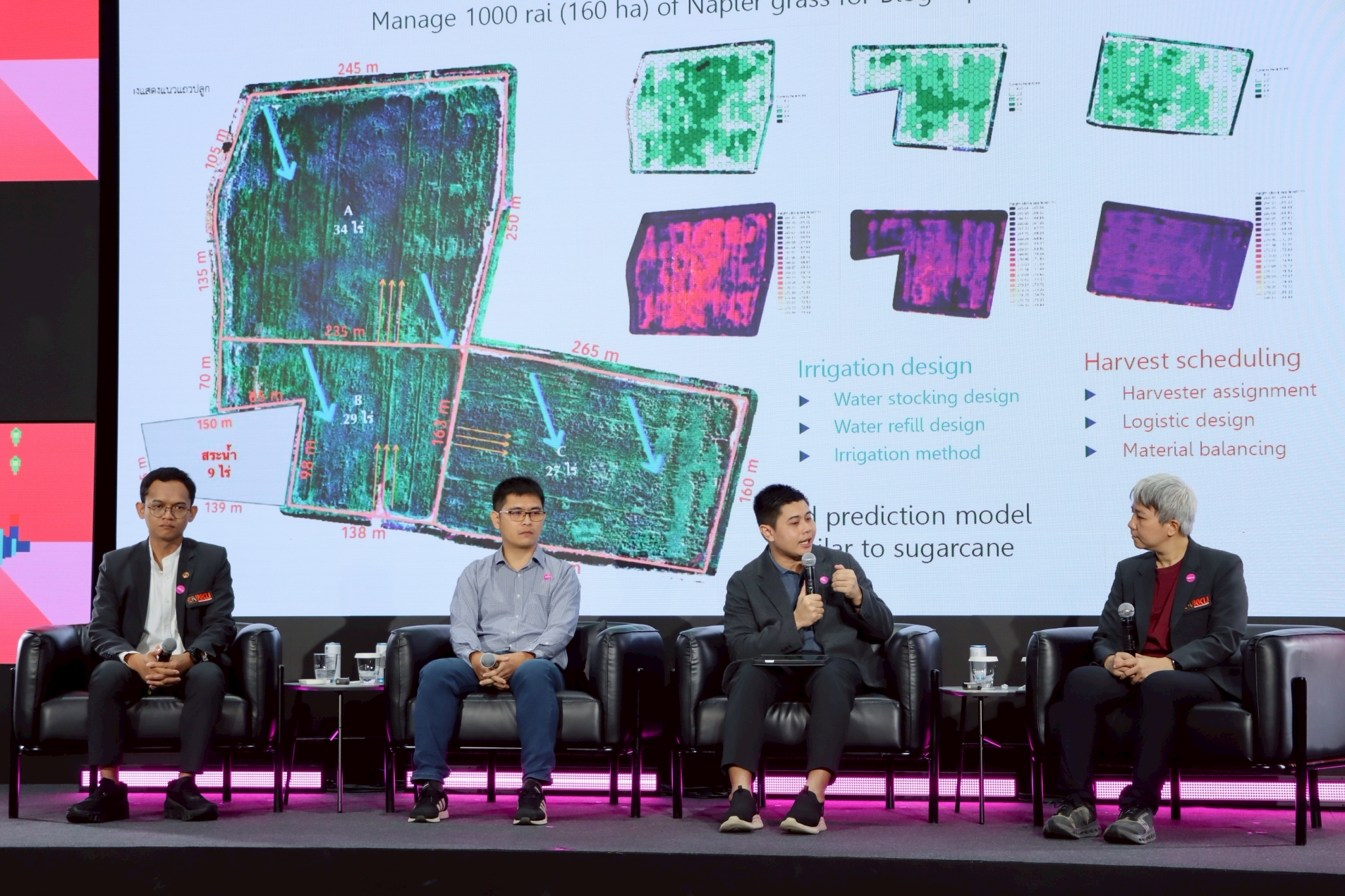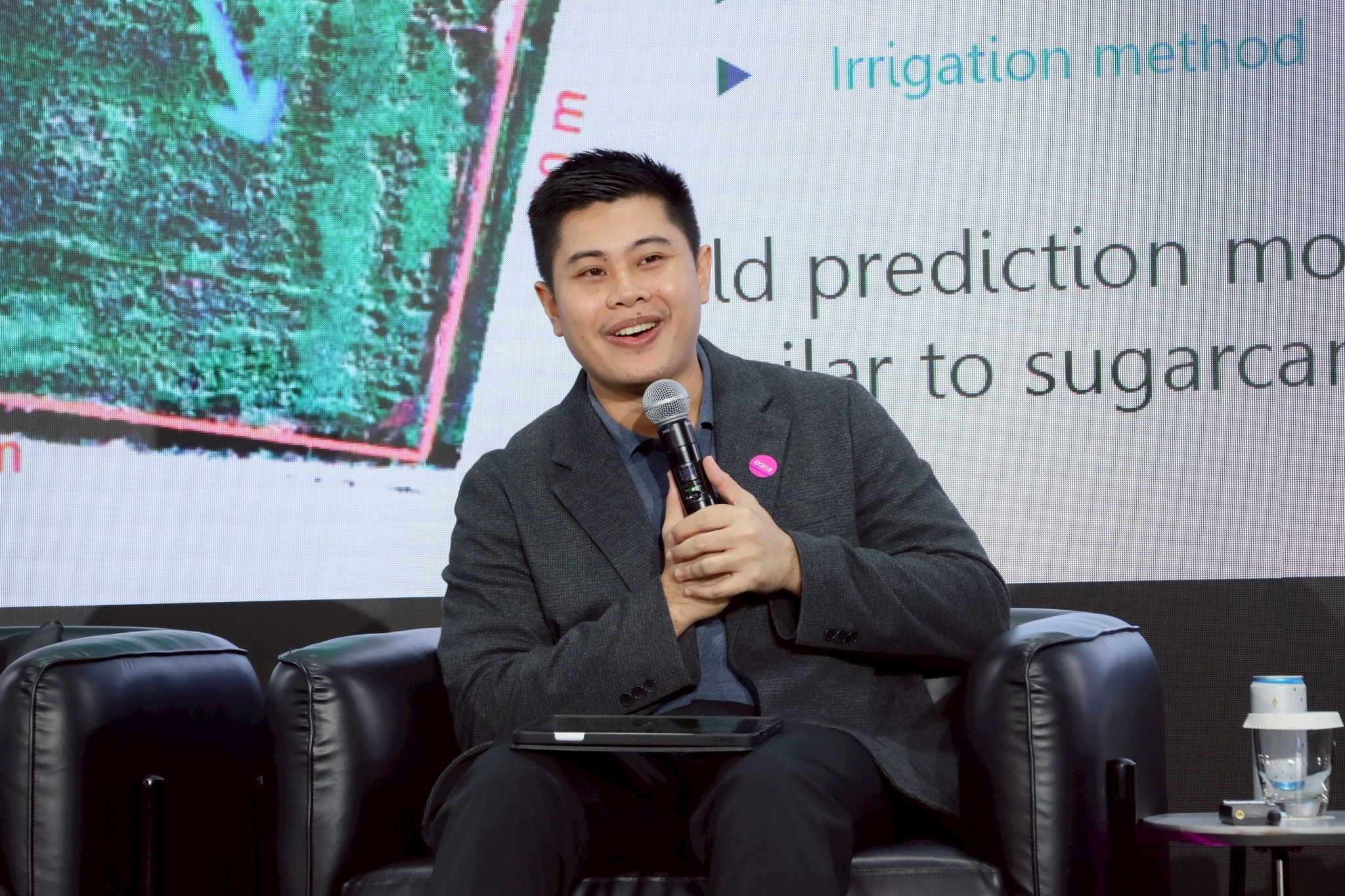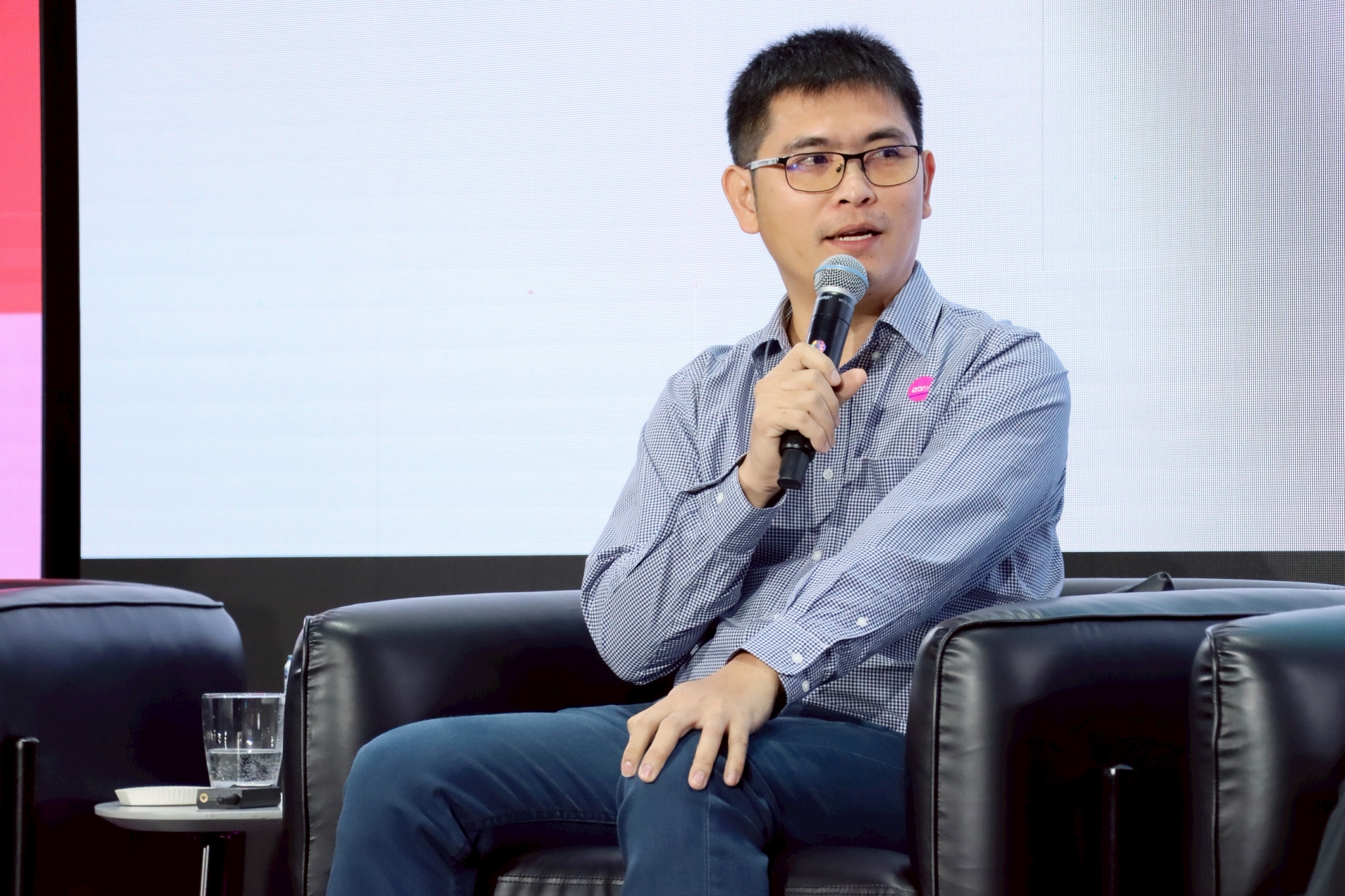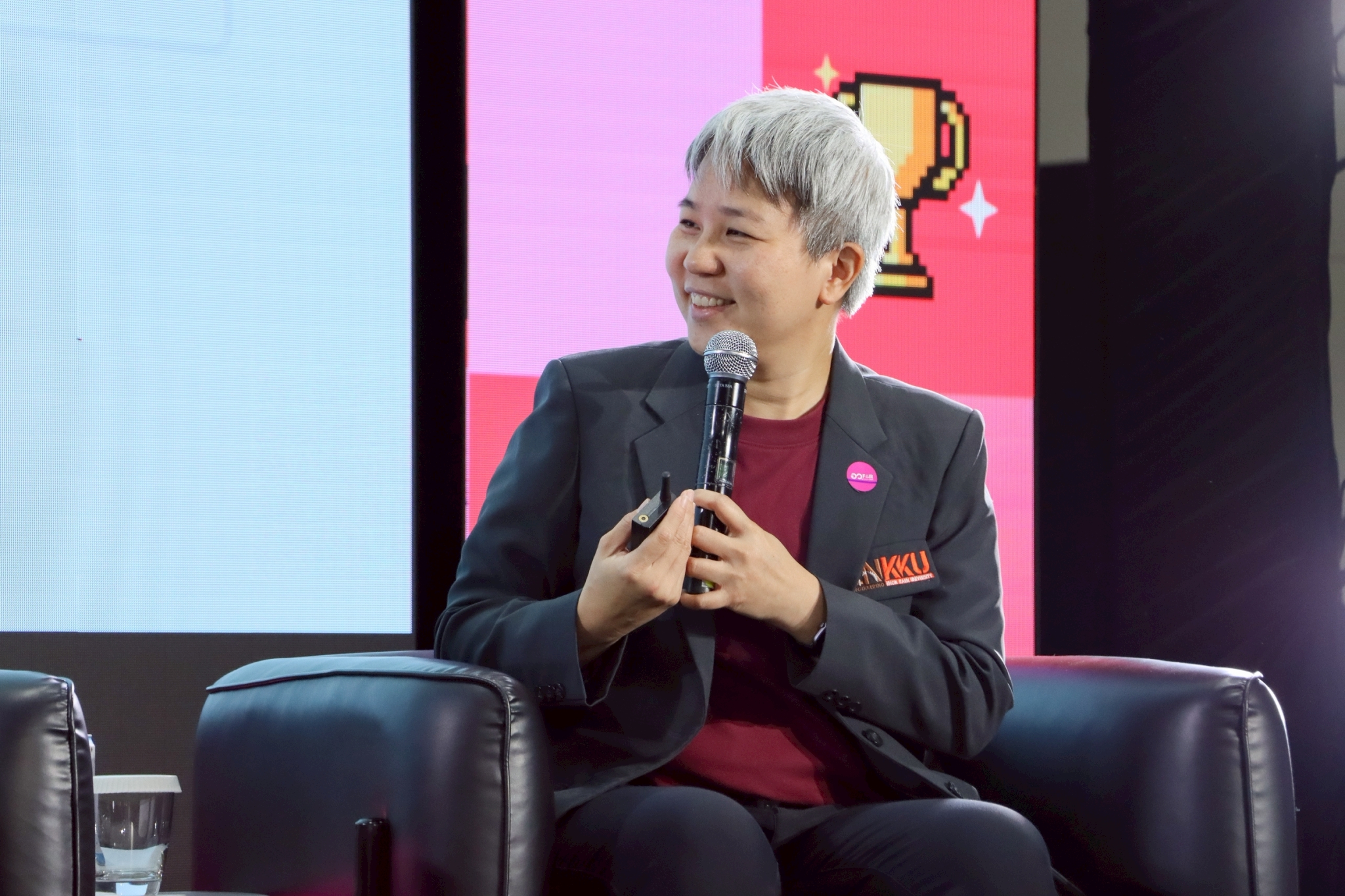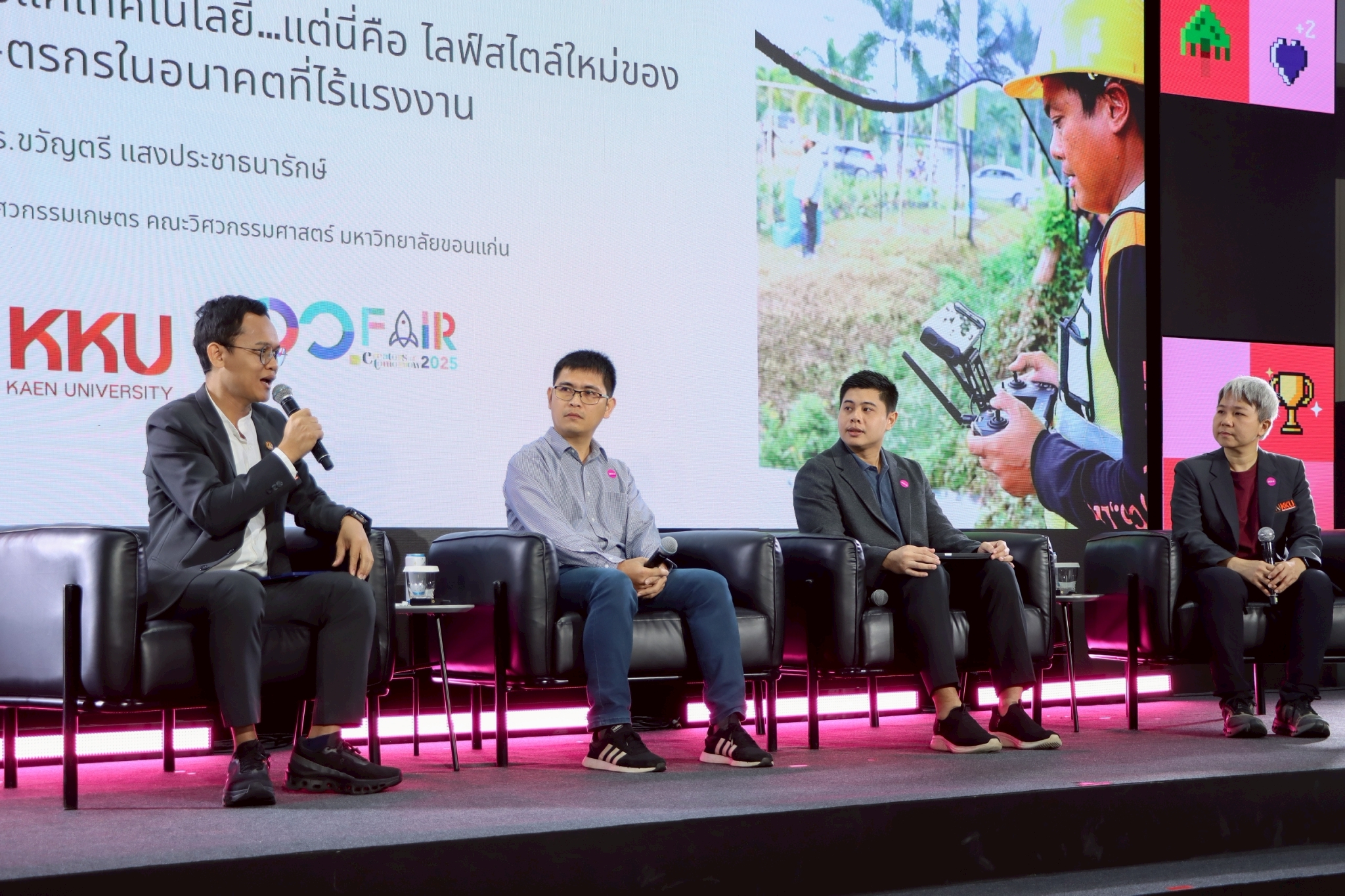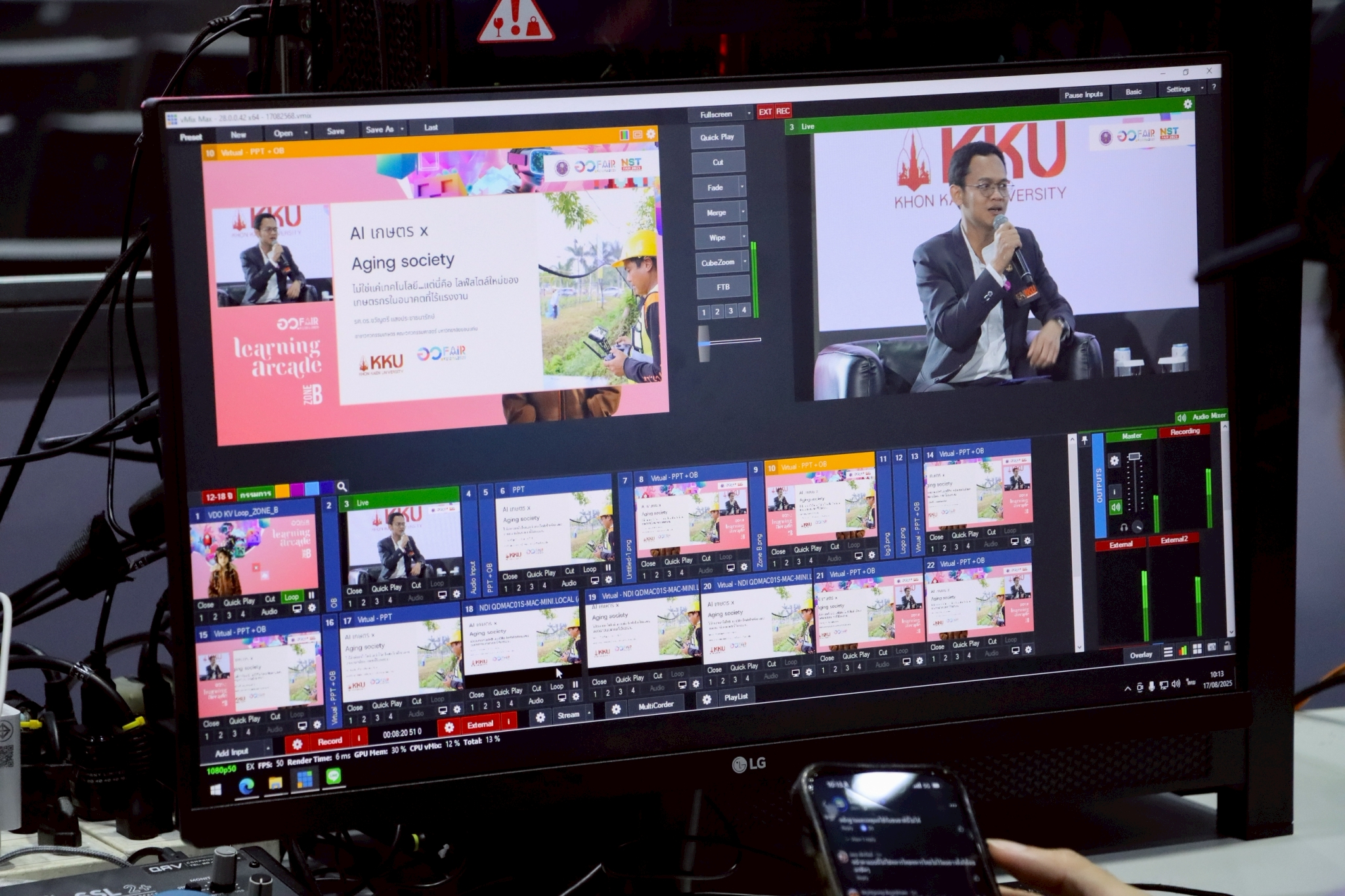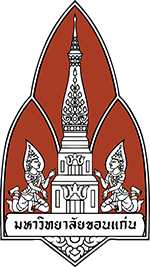KKU Joins Special Panel on “AI Agriculture x Aging Society,” Opening New Perspectives Toward a Labor-Free Agricultural Future at MHESI Fair 2025
มข. ร่วมเสวนาพิเศษ “AI เกษตร x Aging Society” เปิดมุมมองใหม่สู่อนาคตเกษตรไร้แรงงาน ในงาน อว.แฟร์ 2025
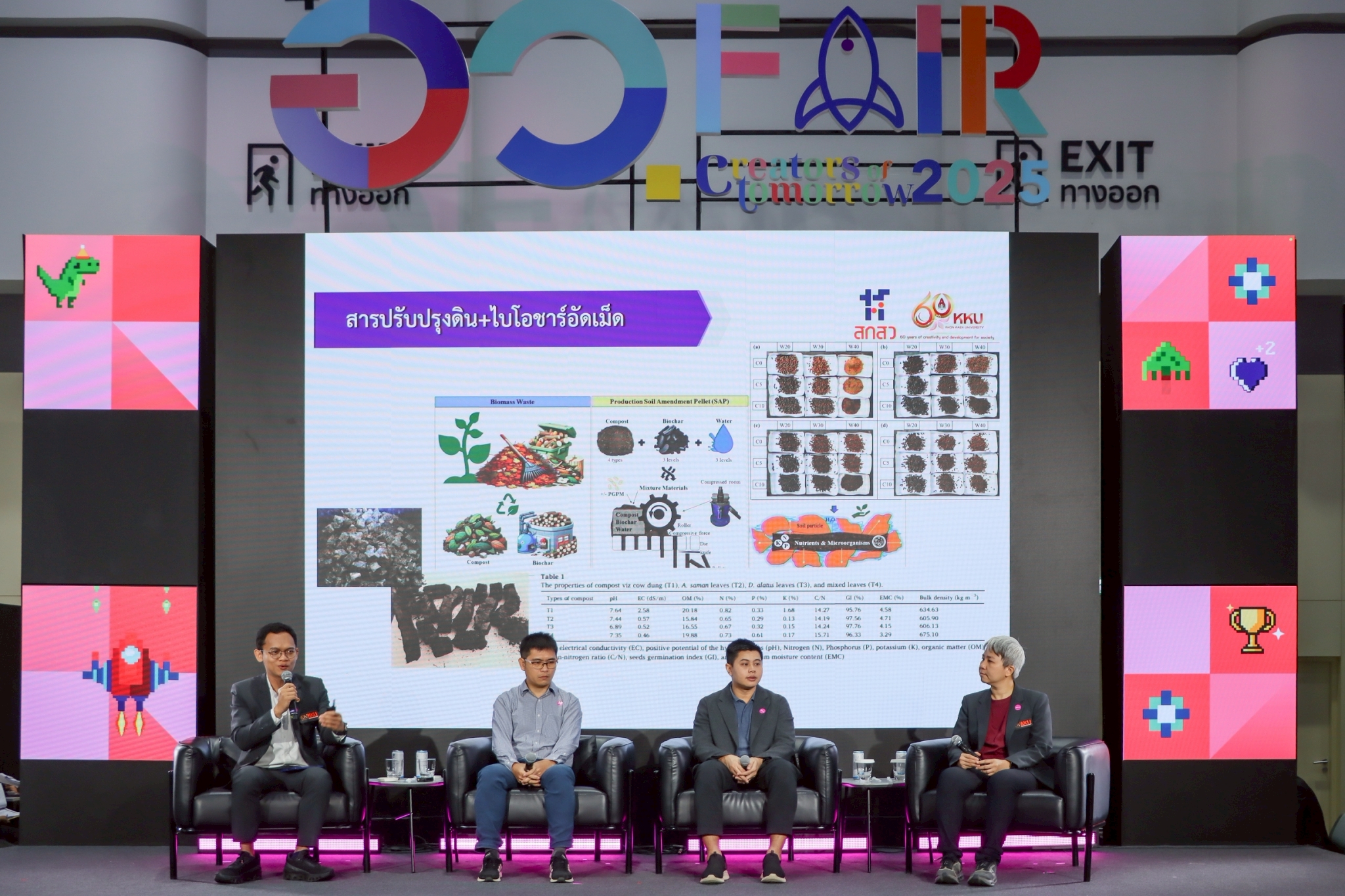
On August 17, 2025, from 10:00 to 11:00 a.m., faculty members from the Department of Agricultural Engineering, Faculty of Engineering, Khon Kaen University, participated in a special panel discussion titled “AI Agriculture x Aging Society: Not Just Technology… But a New Lifestyle for Future Labor-Free Farmers”at Mini Stage Zone B, Queen Sirikit National Convention Center, during the MHESI Fair 2025.
เมื่อวันที่ 17 สิงหาคม 2568 เวลา 10.00 – 11.00 น. คณาจารย์จากสาขาวิชาวิศวกรรมเกษตร คณะวิศวกรรมศาสตร์ มหาวิทยาลัยขอนแก่น เข้าร่วมเวทีเสวนาในหัวข้อ “AI เกษตร x Aging Society : ไม่ใช่แค่เทคโนโลยี…แต่นี่คือไลฟ์สไตล์ใหม่ของเกษตรกรในอนาคตที่ไร้แรงงาน”ณ Mini Stage Zone B ภายในงาน อว.แฟร์ 2025 ณ ศูนย์การประชุมแห่งชาติสิริกิติ์
.
The session brought together experts in agricultural technology and innovation who exchanged perspectives on applying AI and modern agricultural technologies to address the challenges of an aging society and future labor shortages. Distinguished speakers included:
- Associate Professor Khwantri Saengprachatanarug, PhD
- Associate Professor Kittipong Laloon, PhD
- Associate Professor Jetsada Posom, PhD
- Assistant Professor Arthit Phuphaphud, PhD
เวทีเสวนาครั้งนี้ได้รับเกียรติจากวิทยากรผู้เชี่ยวชาญด้านเทคโนโลยีเกษตรและนวัตกรรม ร่วมแลกเปลี่ยนมุมมองด้านการประยุกต์ใช้ AI และเทคโนโลยีเกษตรสมัยใหม่ เพื่อรับมือกับสังคมผู้สูงอายุและการขาดแคลนแรงงานในอนาคต ได้แก่
- รศ.ดร.ขวัญตรี แสงประชาธนารักษ์
- รศ.ดร.กิตติพงษ์ ลาลุน
- รศ.ดร.เจษฎา โพธิ์สม
- ผศ.ดร.อาทิตย์ ภูผาผุด
.
The panel was moderated by Associate Professor Khwantri Saengprachatanarug, who emphasized the urgent challenges posed by Thailand’s rapidly aging society, where more than 20% of the population is now over 60. She noted that fewer young people are entering agriculture, which could lead to severe labor shortages in the sector. She highlighted the concept of “Triple A’ — AI, Agriculture, and Aging—as a framework for transforming this crisis into opportunity, enhancing productivity and quality in agriculture.
โดยมี รศ.ดร.ขวัญตรี แสงประชาธนารักษ์ เป็นผู้ดำเนินรายการ และได้กล่าวถึง “การใช้ AI ในการเกษตรและผลกระทบต่อสังคมสูงวัยในประเทศไทย สิ่งที่น่ากังวลในตอนนี้คือประเทศไทยกำลังเข้าสู่สังคมสูงวัยอย่างรวดเร็ว ประชากรที่มีอายุ 60 ปีขึ้นไปในประเทศไทยมีมากกว่า 20% แล้ว คนรุ่นใหม่ไม่อยากทำการเกษตร ซึ่งอาจส่งผลกระทบต่อแรงงานในภาคเกษตรกรรม เราจะรับมือและอยู่ร่วมกับ AI, Ariculture และ Aging หรือว่า Triple Aนี้ได้อย่างไรให้มีประสิทธิภาพจากการเปลี่ยนวิกฤตให้เป็นโอกาส สามารถยกระดับคุณภาพและผลผลิตทางการเกษตรได้“
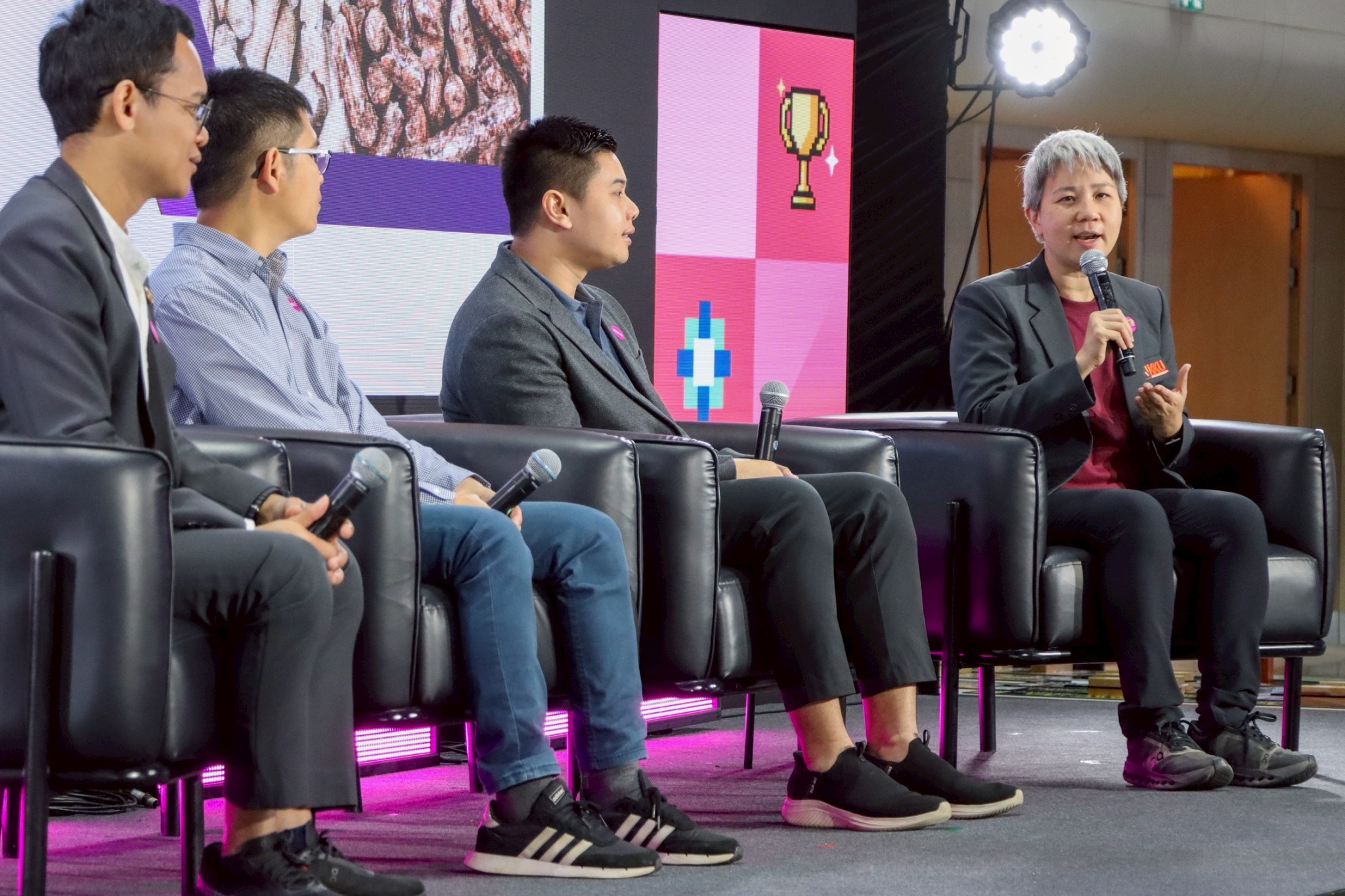
.
Assoc. Prof. Khwantri stressed that farmers must shift from being “manual laborers” to becoming “modern farm managers,” leveraging digital tools and AI. The core of this transformation lies in Farm ERP, a centralized agricultural management platform providing shared databases nationwide—from fertilizer formulas and production methods to proven management models. AI further supports investment planning, data analysis, and real-time decision-making through intelligent online consulting systems. Complementary technologies such as IoT sensors, drones, and satellite imaging enable precise crop health assessments, early disease detection, and improved decision-making.
“These tools are no longer just technologies—they are becoming a new lifestyle for farmers of the future,” she remarked, noting the rise of the Agri Service Provider model within a sharing economy, well-suited to a society with declining labor forces.
.
After that, there was an exchange of key ideas on Triple A, joined by three additional speakers as follows:
.
รศ.ดร.ขวัญตรี ได้สะท้อนมุมมองว่า การก้าวสู่สังคมสูงวัย ทำให้แรงงานภาคการเกษตรลดลงอย่างต่อเนื่อง เกษตรกรจึงต้องปรับตัวจาก “ผู้ใช้แรงงาน” สู่ “ผู้จัดการฟาร์มยุคใหม่” ที่ใช้ดิจิทัลและ AI เป็นเครื่องมือสำคัญ หัวใจของการเปลี่ยนผ่านนี้อยู่ที่ Farm ERP หรือ ศูนย์กลางการจัดการฟาร์มพืชเศรษฐกิจ ที่ช่วยให้เกษตรกรมีข้อมูลกลาง ใช้ร่วมกันได้ทั่วประเทศ ไม่ว่าจะเป็นสูตรปุ๋ย สูตรการผลิต ไปจนถึงโมเดลการจัดการที่พิสูจน์แล้วว่าประสบความสำเร็จ ขณะเดียวกัน AI ยังช่วยในหลายมิติ ตั้งแต่การวางแผนลงทุน การวิเคราะห์ข้อมูล ไปจนถึงระบบ โค้ชออนไลน์อัจฉริยะ (AI Consulting & Real-time Costing) ที่ให้คำแนะนำแบบเรียลไทม์ เทคโนโลยีเสริม เช่น IoT เซ็นเซอร์ เครื่องมือวัด โดรน และภาพถ่ายดาวเทียม ถูกนำมาใช้เพื่อประเมินสุขภาพพืช บอกโรค และช่วยตัดสินใจอย่างแม่นยำยิ่งขึ้น
สิ่งเหล่านี้ไม่ใช่แค่เครื่องมือ แต่กำลังกลายเป็น “วิถีชีวิตใหม่ของเกษตรกรในอนาคต” ที่เปลี่ยนบทบาทจากผู้ผลิตไปสู่การเป็น Agri Service Provider หรือผู้ให้บริการทางการเกษตร ในลักษณะของ Sharing Economy ซึ่งเหมาะสมกับสังคมสูงวัยที่แรงงานกำลังหายไป
จากนั้นได้มีการแลกเปลี่ยนแนวคิดสำคัญเกี่ยวกับ Triple A โดยมีวิทยากรร่วมแลกเปลี่ยน โดยวิทยากรอีก 3 ท่าน ดังนี้
Asst. Prof. Arthit Phuphaphud opened the discussion by highlighting effective field management through the use of agricultural drone imaging to analyze cultivation areas and assess crop health.
By developing AI to analyze aerial images, it becomes possible to accurately determine the fertilizer requirements of crops, thereby reducing risks associated with traditional farming practices that often lead to losses and difficulties in cost control.
Drone imaging technology also enables farmers to better predict optimal harvesting periods, plan cultivation in alignment with weather conditions, and identify specific areas requiring fertilizer application—helping reduce costs and improve production efficiency.
If integrated with the private sector to further develop the system into a tool that can provide in-depth recommendations, this technology would significantly enhance the capacity of Thai farmers. He concluded with a powerful statement:
“AI transforms hard work into true value.”

ผศ.ดร.อาทิตย์ ภูผาผุด เปิดประเด็นด้วยการจัดการแปลงที่ดีจากการใช้ โดรนถ่ายภาพมุมสูงทางการเกษตร เพื่อวิเคราะห์พื้นที่เพาะปลูกและประเมินความสมบูรณ์ของพืชผล
โดยการพัฒนา AI มาช่วยวิเคราะห์ภาพถ่าย ซึ่งสามารถตรวจสอบความต้องการปุ๋ยของพืชได้อย่างแม่นยำ ลดความเสี่ยงจากการใช้วิธีการเก็บเกี่ยวแบบดั้งเดิมที่อาจส่งผลให้ขาดทุนและควบคุมต้นทุนได้ยาก
เทคโนโลยีภาพถ่ายจากโดรนยังช่วยเกษตรกรคาดการณ์ช่วงเวลาเก็บเกี่ยวได้เหมาะสม วางแผนการเพาะปลูกให้สอดคล้องกับสภาพอากาศ รวมถึงระบุพื้นที่ที่ต้องการปุ๋ยอย่างจำเพาะเจาะจง เพื่อลดต้นทุนและเพิ่มประสิทธิภาพในการผลิต
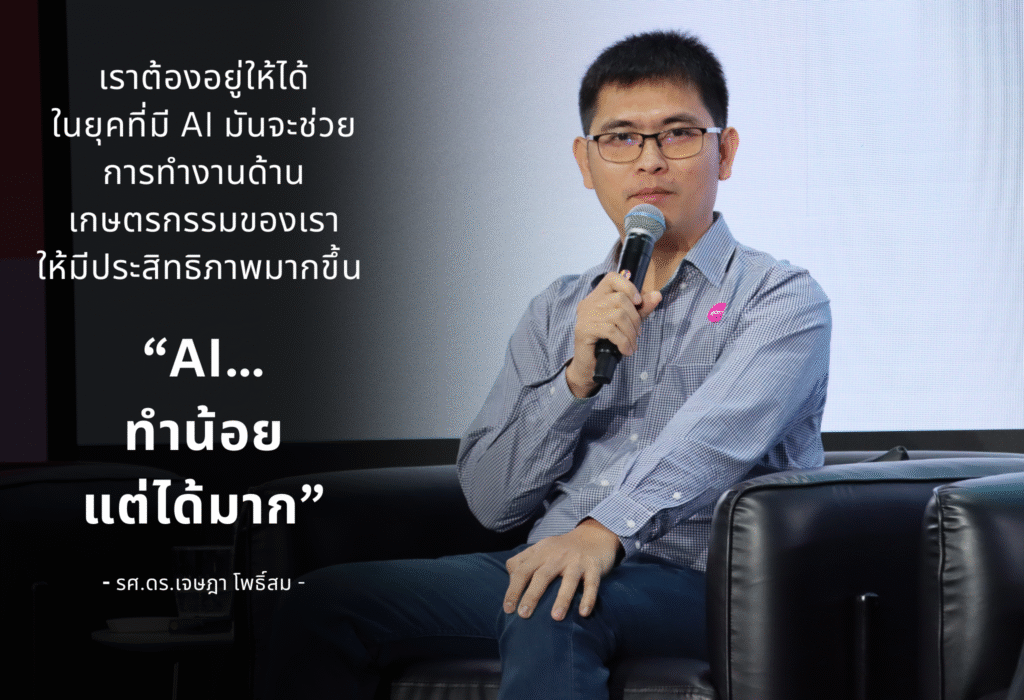
Assoc. Prof. Jetsada Posom discussed approaches to Enhancing Standards and Quality of Agricultural Products through the Application of Sensors. A key approach to upgrading the standards and quality of agricultural products is the application of sensors to accurately analyze and grade produce. These technologies can measure sweetness, fruit ripeness, or even the starch content in cassava roots—unlike traditional sorting methods that rely on manual labor and physical attributes such as shape, color, size, or taste, which may not fully meet market demands. The studied sensor technology is the Near-infrared (NIR) sensors, which allows non-destructive quality measurement of produce. This enables grading directly at the source, allowing farmers to sell products across multiple price tiers instead of only one mixed grade. Furthermore, it can be applied in crop breeding development, such as measuring sugar content in sugarcane to improve varieties with higher quality. The integration of AI and sensor technologies not only enhances production precision but also addresses the challenges of an aging society by reducing labor demands, while simultaneously increasing farmers’ income and quality of life. These technologies are adaptable for use both at the farm level and in industrial applications. The core takeaway is that we must learn to thrive in the age of AI—where it empowers us to work more efficiently: “AI… Do less, achieve more.”
รศ.ดร.เจษฎา โพธิ์สม กล่าวถึงแนวทางการยกระดับมาตรฐานและคุณภาพผลผลิตทางการเกษตรด้วยการประยุกต์ใช้เซนเซอร์ เพื่อช่วยวิเคราะห์คุณภาพและคัดเกรดผลผลิตอย่างแม่นยำ โดยสามารถตรวจวัดความหวาน ระดับความสุกของผลไม้ หรือแม้กระทั่งปริมาณแป้งในหัวมันสำปะหลัง ซึ่งแตกต่างจากวิธีการคัดแยกแบบดั้งเดิมที่อาศัยแรงงานคนและใช้เกณฑ์รูปร่าง สี ขนาด หรือรสชาติ ที่อาจไม่ตอบสนองต่อความต้องการของตลาดได้อย่างครบถ้วน
เทคโนโลยีเซนเซอร์ที่วิจัยและศึกษาคือ NIR Sensor ที่ใช้วัดคุณภาพผลผลิตโดยไม่ทำลายตัวอย่าง ช่วยให้สามารถคัดแยกเกรดได้ตั้งแต่ต้นทาง เกษตรกรจึงสามารถจำหน่ายผลผลิตในหลากหลายระดับราคา แทนการขายแบบคละเกรดเพียงราคาเดียว นอกจากนี้ ยังสามารถนำมาใช้เพื่อการพัฒนาสายพันธุ์ เช่น การตรวจวัดความหวานของอ้อย เพื่อใช้ปรับปรุงพันธุ์ให้มีคุณภาพสูงขึ้น
การผสานการทำงานระหว่าง AI และเซนเซอร์ ไม่เพียงช่วยให้การผลิตมีความแม่นยำมากขึ้น แต่ยังตอบโจทย์สังคมผู้สูงอายุที่ลดภาระการใช้แรงงาน พร้อมเพิ่มรายได้และคุณภาพชีวิตให้กับเกษตรกร อีกทั้งยังสามารถนำไปประยุกต์ใช้ได้ทั้งในระดับแปลงเกษตรกรและระดับอุตสาหกรรม
พร้อมทิ้งแนวคิดสำคัญว่า เราต้องอยู่ให้ได้ในยุคที่มี AI มันจะช่วยการทำงานด้านเกษตรกรรมของเราให้มีประสิทธิภาพมากขึ้น “AI…ทำน้อย แต่ได้มาก”
Assoc. Prof. Kittipong Laloon discussed the creation of added value from agricultural residues, emphasizing that what many perceive as worthless can, in fact, be developed into something immensely beneficial. This is especially true in the dimension of biomass energy, for which Thailand continues to have high demand but still lacks security in energy supply. For example, sugarcane leaves left after harvest are often burned by farmers, causing fine particulate matter (PM 2.5) pollution. Today, however, Farm ERP systems and AI technologies are being introduced to better manage these residues, enabling them to be compressed into biomass fuel. Additionally, biochar technology and charcoal briquettes are being applied to reduce carbon emissions in agriculture while generating extra income and adding value to what was once regarded as mere waste. Dr. Kittipong stressed the opportunities and importance of adopting AI and innovation, stating: “AI is a new challenge—not a replacement, but a complement that enhances efficiency and sustainability in the agricultural society.”

รศ.ดร.กิตติพงษ์ ลาลุน ได้กล่าวถึงการสร้างมูลค่าเพิ่มจากวัสดุเหลือทิ้งทางการเกษตร โดยชี้ให้เห็นว่า สิ่งที่หลายคนมองว่าไม่มีคุณค่า แท้จริงแล้วสามารถต่อยอดและสร้างประโยชน์ได้อย่างมหาศาล โดยเฉพาะในมิติของพลังงานชีวมวล ซึ่งประเทศไทยยังมีความต้องการใช้อย่างต่อเนื่อง แต่ยังขาดความมั่นคงด้านการจัดหาพลังงาน
ยกตัวอย่างกรณี ซากใบอ้อยที่เหลือจากการเก็บเกี่ยว ซึ่งเกษตรกรส่วนใหญ่มักใช้วิธีเผาทำลาย ก่อให้เกิดปัญหาฝุ่นละอองขนาดเล็ก (PM 2.5) ปัจจุบันได้มีการนำ ระบบ Farm ERP และเทคโนโลยี AI เข้ามาช่วยบริหารจัดการ เพื่อต่อยอดซากใบอ้อยให้สามารถอัดเป็นเชื้อเพลิงชีวมวลได้ รวมถึงการประยุกต์ใช้ เทคโนโลยีไบโอชาร์ (Biochar) และถ่านอัดแท่ง ที่ช่วยลดการปลดปล่อยคาร์บอนในภาคการเกษตร พร้อมทั้งสร้างรายได้เสริมและเพิ่มมูลค่าให้กับสิ่งที่เดิมถูกมองว่าเป็นเพียงของเหลือทิ้ง
รศ.ดร.กิตติพงษ์ ย้ำถึงโอกาสและความสำคัญของการประยุกต์ใช้ AI และนวัตกรรม ว่า “AI คือความท้าทายใหม่ ที่ไม่ได้มาแทนที่…แต่มาเติมเต็ม เพื่อให้สังคมเกษตรมีประสิทธิภาพ และยั่งยืน”
.
And in the concluding session of the discussion, Assoc. Prof. Khwantri Saengprachatanarug summarized the key takeaways, stating that:
“…From everything shared today, AI does not take away our jobs. Rather, we simply need to adapt, keep up, and learn to use it effectively. AI can support us in advancing agricultural work and serve as a powerful tool to ease our labor.“
‘AI does not replace farmers, but becomes an essential assistant that enables agriculture to continue sustainably in an aging society.’
.
และในช่วงสุดท้ายของการเสวนา รศ.ดร.ขวัญตรี แสงประชาธนารักษ์ ได้สรุปภาพรวมของการเสวนาในวันนี้ว่า…จากทั้งหมดที่มาเล่าให้ฟังในวันนี้ AI ไม่ได้ทำให้เราตกงาน แต่เราแค่ต้องปรับตัวและตามให้ทัน ใช้ให้เป็น แล้วมันจะสามารถช่วยให้เราได้พัฒนางานด้านเกษตรและเป็นเครื่องทุนแรงให้เราได้อีกมาก “AI ไม่ได้เข้ามาแทนที่เกษตรกร แต่เข้ามาเป็นผู้ช่วยสำคัญ ที่ทำให้การเกษตรในสังคมสูงวัยดำเนินไปได้อย่างยั่งยืน”

